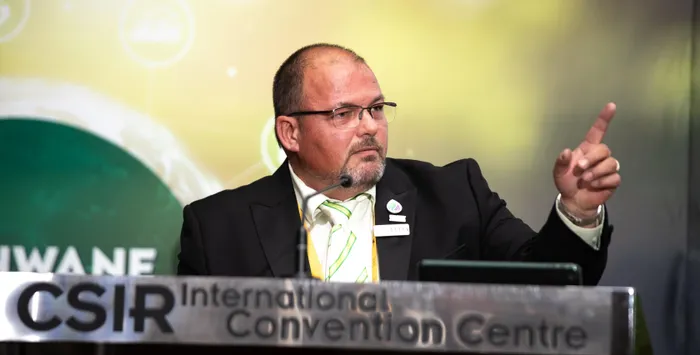
TEDA CEO Dr Lardo Stander formally launched the Youth Innovation Challenge for 2025.
Image: Supplied
Energy is more than the provision of electricity; it is the foundation on which the economy and our quality of life are built.
It is critical that cities, as centres of economic activity and social hubs for residents, have reliable, affordable, and sustainable sources of energy that allow for driving global competitiveness, attracting investment, and fostering inclusive growth.
Based on the crucial role of energy, particularly in South Africa which has had to deal with an unreliable supply of energy, South Africa’s capital city hosted the 2025 Tshwane Energy Summit under the theme “Energy: A catalyst for economic growth”.
Importantly, the summit took place alongside the 2025 African Mayors’ Assembly and the U20 Sherpa’s meeting, where climate resilience was a key issue on the respective agendas.
A recent global study across 134 countries confirmed that stable, cleaner energy, paired with robust financial services and human capital investment, significantly boosts long-term GDP growth.
For the City of Tshwane, energy resilience is essential to overcoming historic economic underperformance caused by load shedding, infrastructure damage, and rising maintenance costs, which deter investment and job creation.
The City of Tshwane, supported by the Tshwane Economic Development Agency, is leading South Africa’s energy transition by enabling private-public partnerships, smart infrastructure, and distributed energy systems.
Launched at the first Tshwane Energy Summit in 2024, the City’s Climate Action Plan emphasises a smart, sustainable energy system to support decarbonisation and inclusive development.
Key initiatives include:
The summit also served as a launch pad for an innovative initiative aimed at the youth – notably UNISA students – to take part in an innovative renewable energy challenge.
Tshwane’s vision is a resilient, inclusive, low-carbon energy future. The city is enabling and embracing wheeling agreements, trading frameworks, and the Renewable Energy Public-Private Partnership (RE-PPP) to diversify supply and create a dynamic local energy market.
TEDA driving innovation in the energy sector
South Africa is a country driven by innovation: think of the CAT scan that provides a cross-section of the tissues within the body, the first heart transplant, the speed gun used to measure the speed of a ball in various sports, Pratley Putty used by NASA on its moon landing mission, Sasol’s oil from coal, the smartlock safety syringe that provides improved protection against needlestick injury and contamination by ebola virus, hepatitis and HIV, to name just a few.
It is within South Africans and especially our young people, to innovate, to dream, to conceive, and it's up to us as stakeholders, as government, to help them conceptualize and develop their solutions that they can then make a living from, that they can move themselves from wherever they find themselves.
TEDA CEO Dr Lardo Stander formally launched the Youth Innovation Challenge for 2025, which is being led by the City of Tshwane’s innovation team in partnership with UNISA.
The aim of the challenge is to deliver Direct Current (DC) off-grid electricity solutions for the informal settlements in the City of Tshwane – to find an alternative power solution, to ease the burden on the existing network, to provide basic electricity for all, to cut carbon emissions, to create jobs within communities, and to promote renewable, sustainable energy.
The goals behind the challenge are to design low-cost clean energy solutions for informal and low-income housing and to increase awareness and adoption of solar energy in informal settlements.
This challenge will see TEDA and the City of Tshwane support small, medium, and micro entities and young innovative entrepreneurs.
Starting from July 1, 2025, the challenge is open to all eligible UNISA students.
Pretoria News
Related Topics: